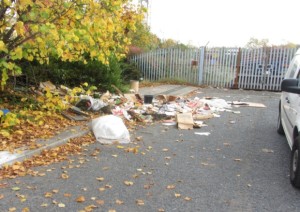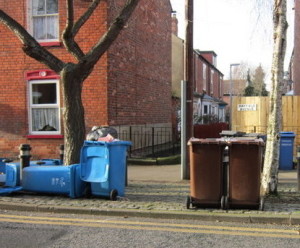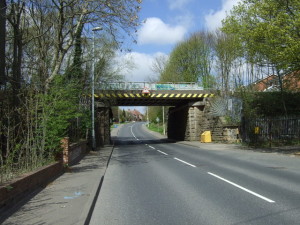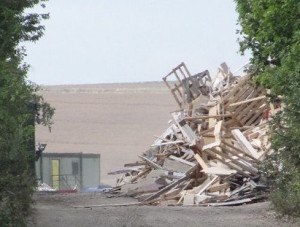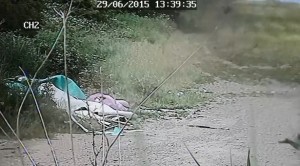Two fly-tippers prosecuted by Leeds City Council
A Leeds homeowner and a tradesman have been fined for fly-tipping in Leeds
Two individuals have been prosecuted in Leeds Magistrates’ Court after they were connected to two separate incidents of fly-tipping on the streets of Leeds.
The first culprit, Florentina Daniela Ciurar, of Hunslet, dumped household renovation waste on Woodview Street, directly in front of her renovation project. Environmental officers from Leeds City Council chose to prosecute the woman because the waste was endangering the public as it was spilling over onto the road.
Leeds City Council organised the removal of the waste, which included used carpet, old furniture and miscellaneous household items. She was fined £250, and ordered to pay costs of £500 and a £25 victim surcharge.
A ‘man and a van’ business owner was also prosecuted in Leeds Magistrates’ Court after dumping waste at a retail park in Hunslet. David Horsefield, of Belle Isle, had collected household waste from a customer but had disposed of it illegally rather than paying for its disposal. Leeds City Council officers were able to connect the offender’s van to the fly-tipping crime.
Mr Horsefield claimed that someone else had been using his van when the waste had been fly-tipped, but this could not be proved in court. He was fined £250 and ordered to pay costs of £350 and a £25 victim surcharge.
Councillor Mark Dobson, from Leeds City Council, commented: “While we prefer to work with residents and businesses to educate and encourage people on proper ways to dispose of rubbish, there are times when we have to take immediate legal action and clean up to protect communities.”
To find out more about Biggreen.co.uk ‘s waste management services, please follow this link.
£100,000 to be spent by Hull City Council on expert recycling advice
Help for residents on what to recycle in which bins
Hull City Council is to spend £100,000 on expert advice on how to correctly use the recycling bins that every home in the UK is provided with. The overall aim of the spend is to help residents understand what items should be placed in which bin and to reduce the amount of wrong items being placed in the blue bins.
The council have said that incorrect items placed in the wrong bin is costing around £50,000 in penalties per month. A penalty is received if over 15% of the recycled rubbish contains incorrect items.
24,000 tonnes of recyclable rubbish is collected from households every year in Hull and around 20% of that total weight shouldn’t be placed in the blue bin.
A statement from the Council reports that about £60,000 of council tax payers’ money is going to waste because of the wrong type of rubbish going into bins, money which could be spent on improving other services.
The council believes that the campaign to raise public awareness on how to use the bins correctly will be money well spent and will, in the long term, help to keep costs down and improve the recycling services in the city.
2,150 blue bins have been removed by the council from residents that are believed to be consistently placing the wrong rubbish in the blue bins.
Blue bins should only be used to recycle cardboard, glass, paper, tins and some plastics.
To find out more about our waste management services, please click here.
Apple experiencing the financial benefits of resource recycling
US tech firm recovered almost $40m worth of gold from old products last year
Apple’s annual Environmental Responsibility Report reveals that the US tech giant raked in millions of extra revenue last year as a result of product recycling at its California base.
During Apple’s latest media event, it announced a big push in the recycling direction, with the launch of its clever disassembling robot, Liam, which can take an iPhone 6 apart in 11 seconds. The US firm recognises the importance of manufacturer responsibility and the benefits of a circular economy business model.
In typical fashion, Apple has began its recycling efforts in style. The firm’s innovative recycling robots have been hard at work throughout the previous year and have recovered millions of dollars worth of valuable materials from Apple products that have been returned under the company’s Renew take-back programme.
The company’s annual Environmental Responsibility Report shows that Apple recovered 2,204 pounds of gold in 2015. According to BusinessInsider.com, in the current market this amount of gold is worth $39,502,000. Apple is recycling millions of iPhones and computers each year; FairPhone claims that each iPhone contains 30mg of gold.
In total, Apple recovered an impressive 61,357,800 pounds of valuable materials in 2015. The clever robots also extracted 2,953,360 pounds of copper; 4,518,200 pounds of aluminium; 39,672 pounds of nickel; and 6612 pounds of silver.
Please click here to find out more about our waste management services.
England’s recycling rate fell in 2015
Defra’s statistics show a 0.7 per cent drop in England’s recycling rate in 2015
Provisional data published by the Department for Environment, Food & Rural Affairs (Defra) suggests that England’s recycling rate fell in 2015 for the first time in over 10 years.
The provisional data was released on March 22 and shows that recycling dropped by 0.7 per cent in 2015. This is the first year that recycling rates have fallen in England since 2000/01. In 2014, municipal waste recycling reached 45 per cent, but the rate for 2015 fell to 44.3 per cent.
The amount of waste produced by households in England increased by 0.6 per cent, but overall waste production in England fell by 0.6 per cent compared to 2014.
According to Defra the decrease in recycling can be attributed to a dramatic decrease in the recycling of ‘other organics recycling’ in 2014 compared to 2015; this recycling stream dropped by 5.7 per cent. Defra claims that this was because of dire weather conditions at the beginning of 2014 resulting in more garden recycling at the end of the year.
The overall 0.7 per cent decrease in recycling is the first dip recorded since 2000/01. In this year, England recycled only 11.4 per cent of the waste it generated; by 2010/11 this had risen to 41.5 per cent.
However, in the last four years, the country’s recycling rate has risen by tiny amounts, resulting in fears that England will not be able to meet EU’s 2020 recycling target, which has been set at 50 per cent.
To learn more about Biggreen.co.uk ‘s waste management services, please click here.
Department for Business increases 2016 WEEE collection targets
The WEEE collection target has been increased by 16,000 tonnes for 2016
The Department for Business, Innovation and Skills has increased its 2016 Waste Electrical and Electronic Equipment (WEEE) collection targets following the release of collection data for 2015, which suggested that the initial target was not ambitious enough.
The initial WEEE collection target for 2016 set by the Department for Business, Innovation and Skills was 528,687 tonnes. The data for WEEE evidence published by compliance schemes originally suggested that 512,000 tonnes of WEEE had been collected in 2015.
The Department for Business set the initial target based on the annual average growth of WEEE collection since 2011. However, the figures from the Environmental Agency for complete tonnage of WEEE collected in 2015 show that some WEEE collections had not been accounted for in the original figure.
The new data shows that more than 521,000 tonnes of WEEE was collected by compliance schemes last year. Large household appliances and cooling appliances made up the largest percentage of WEEE collected in England and Wales in 2015, at more than 290,000 tonnes.
As a consequence of this, the Department for Business has increased 2016’s target to 544,341 tonnes. Compared to the initial 2016 target, the new figure for this year has increased by 16,000 tonnes, however, it is a long way off meeting the EU’s target of 730,000 tonnes.
To learn more about Biggreen.co.uk ‘s waste management services, please click here.
Glasgow manufacturer fined for waste packaging offences
A food manufacturer in Glasgow has been fined for flouting business packaging regulations
A food manufacturer based in Glasgow has been prosecuted by the Scottish Environment Protection Agency (SEPA) for failing in its responsibility to recover and recycle waste packaging.
Walter Black Foods of Drumhead Road, Cambuslang Investment Park, were investigated by SEPA in October 2013 when the agency saw that the food manufacturer had ended its member contract with its Producer Responsibility Obligations compliance scheme.
Under the Producer Responsibility Obligations (Packing Waste) Regulation 2007, manufacturers of products that require packaging are required to register as a product producer with SEPA. The producer will then be given recycling obligations which it can choose to fulfil independently or it can join a compliance scheme.
All manufacturers and compliance schemes are required to record their packaging recovery and recycling rates and submit it on demand to SEPA. The Producer Responsibility Regulations are designed to reduce waste packaging being sent to landfill.
SEPA sent multiple warning letters to Walter Black Foods, informing the firm of its registration requirements, but the letters went ignored.
The case was sent to the Procurator Fiscal and Walter Black Foods was obliged to appear in court. The firm pleaded guilty to failing to register in accordance with Producer Responsibility Regulations; failing to supply a certificate of compliance; and therefore failing to recover and recycle its packaging.
The food company was handed a £8,600 fine and was required to pay £28,538 as part of a Confiscation Order under the Proceeds of Crime Act.
To find out more about Biggreen.co.uk ‘s waste management services, please click here.
Mansfield business owner fined for controlled waste offences
Tattoo parlour owner fined in court for fly-tipping controlled waste near his home
A Mansfield business owner has appeared in Mansfield Magistrates’ Court after council officers connected him to the illegal dumping of controlled waste.
The fly-tipped rubbish was found by a Mansfield District Council Neighbourhood Warden in August last year in Hermitage Lane, Mansfield. The waste had been dumped behind the premises of GS Prince and was made up of controlled waste materials.
The council warden carried out an investigation following the find and was able to trace the fly-tipped rubbish back to the owner of Black Anchor Tattoo, Premyslaw Mazurek, 40, who lives close to Hermitage Lane.
Mr Mazurek admitted to illegally disposing of the commercial waste and also to operating a business without holding a waste disposal contract.
The business owner was prosecuted by Mansfield District Council under Section 34 of the Environmental Protection Act 1990 and appeared in Mansfield Magistrates’ Court in March, were he pleaded guilty to the offence.
He was ordered by magistrates to pay a fine of £600, costs of £285, community safety costs of £163.43 and a £60 victim surcharge.
Public Protection Councillor Mick Barton took the opportunity to warn business owners that they are required to possess a business waste contract with a licensed company. He added: “Anyone found without a contract in place is likely to face a prosecution.”
To find out more about Biggreen.co.uk ‘s waste management services, please click here.
Wood recycling firms concerned following new EA guidelines
Waste business owners are worried about the EA’s new fire prevention plan
The owners of waste wood firms across England are being encouraged by the Wood Recyclers’ Association (WRA) to lobby their local MPs, as its claims the Environmental Agency’s new fire prevention regulations are “not fit for purpose”.
The Fire Prevention Plan (FPP) has not yet been officially adopted by the Environmental Agency, but its consultation period has now ended and a final decision is to be made. The Environmental Agency has confirmed that it received 126 responses from businesses, organisations and individuals involved within the waste industry.
The new Fire Prevention Plan (FPP) will effect all businesses dealing with combustible waste, including those dealing with waste wood and waste tyres, to name just a couple.
The Wood Recyclers’ Association (WRA) has said that many individuals within the wood waste industry are worried about the consequences if the new plan comes into effect. Chairman of the WRA, Andy Hill, told letsrecycle.com that these individuals “genuinely fear for their livelihoods going forward”.
Some of the new regulations proposed in the FPP, include woodpile sizes and spaces between woodpiles; limiting burn-time to 3-4 hours; increasing stock-rotation timescales; and limiting storing periods.
Each waste company will also be required to produce a Fire Prevention Plan, which the Environmental Agency must approve.
Mr Hill told letrecycle.com that many of the proposed regulations are not based on any scientific research. He added: “…we would like the fire and rescue service to have more input at a local level. The WRA believes one size cannot fit all circumstances and we are hopeful we will be able to work with the EA on this going forward.”
please follow this link to find out more about Biggreen.co.uk ‘s waste management services.
Wiltshire man sentenced for operating illegal waste business
Scrap yard owner receives suspended jail sentence for waste offences
The owner of a Wiltshire scrap yard and metal recycling centre has been handed a 18-month suspended jail sentence for operating a waste business without the necessary environmental permits.
Lee Hazel, owner of Melksham Metal Recycling, appeared in Swindon Crown Court on two occasions while the court heard the prosecution and defence. He was found guilty of waste offences and was sentenced to a suspended 18-months jail term on February 18.
An enforcement officer from Wiltshire Council discovered fly-tipped waste on land in Queenfield Farm, Melksham, and was able to trace it back to the premises of Melksham Metal Recycling, because of the “chalky liquid” trail that had been left between the two areas. Concrete pipes, chalky stone and road surfacing material were found deposited at the Farm.
The Environmental Agency carried out its own investigations and found that Melksham Metal Recycling, situated in Station Yard, had a waste disposal contract with a masonry company and was operating an illegal waste disposal business without obtaining the necessary permits. The Environmental Agency sent multiple compliance notices to Mr Hazel but these all went ignored.
Mr Hazel pleaded guilty to multiple waste offences in Swindon Crown Court and was handed a suspended 18-month sentence. His company was also found guilty of similar offences, and both will appear at a hearing in June, when fines and costs are expected to be handed out.
please follow this link to find out more about Biggreen.co.uk ‘s waste management services.
County Durham men fined for fly-tipping controlled waste
Two men fined in court for fly-tipping air conditioning units and carpet
Two County Durham men have appeared in Peterlee Magistrates’ Court after being prosecuted by Durham County Council who caught the two men dumping waste items on rural land.
Andrew Forth and John Bowes used a van to travel to Warren House Gill, Horden, where they fly-tipped air conditioning units and a substantial amount of carpet in the countryside.
Durham County Council were informed of the fly-tipped waste and went to inspect the area. Council officers were able to consult a nearby and strategically-placed CCTV camera, which showed Forth and Bowes unloading the controlled waste from a white Ford Transit van.
The Council was able to trace the van’s registration number to its owner, Forth, who told the officer that his companion on the fly-tipping trip had been one John Bowes.
Bowes told Peterlee Magistrates’ Court that he had not participated in the actual fly-tipping offence but admitted that he had witnessed Forth fly-tipping and therefore pleaded guilty to allowing the illegal disposal of controlled waste. He was ordered to pay a £150 fine and costs of £330.
Forth, aged 29, pleaded guilty to fly-tipping and was was ordered to pay a £352 fine, costs of £410 and a £20 victim surcharge.
Ian Hoult, of Durham County Council, commented: “There is never any excuse for fly-tipping – or being involved in it. We will continue to take action against those who commit waste crimes as part of Operation Stop It and we would urge anyone with information about these types of offences to get in touch.”
To find out more about Biggreen.co.uk ‘s waste management services, please click here.


